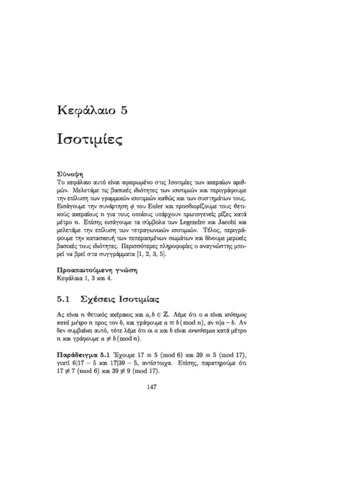| Title Details: | |
|
Congruences |
|
| Authors: |
Poulakis, Dimitrios |
| Reviewer: |
Tzanakis, Nikolaos |
| Subject: | MATHEMATICS AND COMPUTER SCIENCE > MATHEMATICS > NUMBER THEORY MATHEMATICS AND COMPUTER SCIENCE > MATHEMATICS > NUMBER THEORY > COMPUTATIONAL NUMBER THEORY MATHEMATICS AND COMPUTER SCIENCE > COMPUTER SCIENCE MATHEMATICS AND COMPUTER SCIENCE > COMPUTER SCIENCE > ALGORITHMS AND COMPLEXITY |
| Keywords: |
Computational Number Theory
Congruences Linear Congruences Quadratic Residues Finite Fields |
| Description: | |
| Abstract: |
Chapter 4 is devoted to the congruence relations of integers, the description of the properties of their classes and the running time of the execution of theirs basic operations. We study the resolution of linear congruences and theirs systems and we determine for which positive integers there are primitive roots modulo n. Furthermore, we introduce Legendre and Jacobi symbols and we present algorithms for the computation of Jacobi symbols and the solution of quadratic congruences. Finally, we introduce the notion of congruence between polynomials and we give the constuction of finite fields and some basic properties.
|
| Table of Contents: |
Chapter 4 contains the following sections:
5.1 Congruence Relations 5.2 Congruence Classes 5.3 Linear Congruences 5.4 The function φ of Euler 5.5 Order of an integer modulo n 5.6 Residus of m-th power 5.6.1 Legendre' s symbol 5.6.2 Jacobi' s symbol 5.6.3 Solving Quadratic Congruences 5.7 Finite Fields 5.7.1 Polynomial Congruences 5.7.2 Stucture of Finite Fields 5.8 Exercices Bibliography |
| Technical Editors: |
Karakostas, Anastasios |
| Type: |
Chapter |
| Creation Date: | 2015 |
| Item Details: | |
| License: |
http://creativecommons.org/licenses/by-nc-nd/3.0/gr |
| Handle | http://hdl.handle.net/11419/1048 |
| Bibliographic Reference: | Poulakis, D. (2015). Congruences [Chapter]. In Poulakis, D. 2015. Computational Number Theory [Undergraduate textbook]. Kallipos, Open Academic Editions. https://hdl.handle.net/11419/1048 |
| Language: |
Greek |
| Is Part of: |
Computational Number Theory |
| Number of pages |
59 |
| Publication Origin: |
Kallipos, Open Academic Editions |


